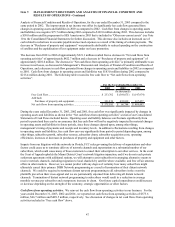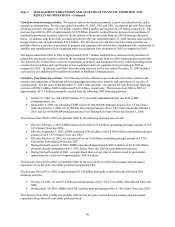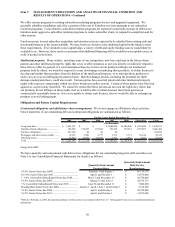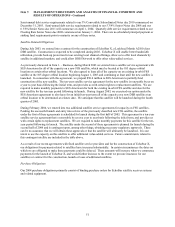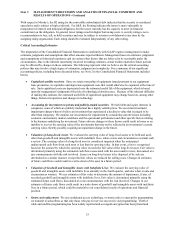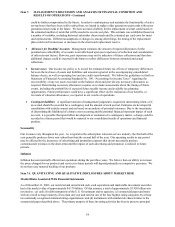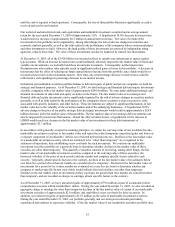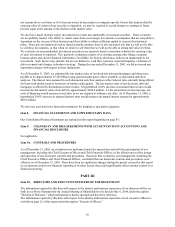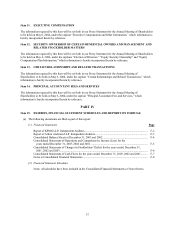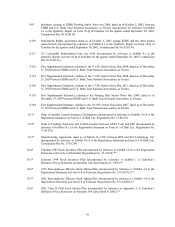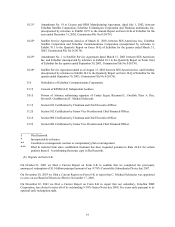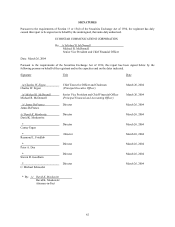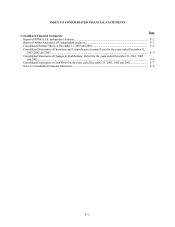Dish Network 2003 Annual Report Download - page 60
Download and view the complete annual report
Please find page 60 of the 2003 Dish Network annual report below. You can navigate through the pages in the report by either clicking on the pages listed below, or by using the keyword search tool below to find specific information within the annual report.55
until the cash is required to fund operations. Consequently, the size of this portfolio fluctuates significantly as cash is
received and used in our business.
Our restricted and unrestricted cash, cash equivalents and marketable investment securities had an average annual
return for the year ended December 31, 2003 of approximately 2.0%. A hypothetical 10.0% decrease in interest rates
would result in a decrease of approximately $6.5 million in annual interest income. The value of certain of the
investments in this portfolio can be impacted by, among other things, the risk of adverse changes in securities and
economic markets generally, as well as the risks related to the performance of the companies whose commercial paper
and other instruments we hold. However, the high quality of these investments (as assessed by independent rating
agencies), reduces these risks. The value of these investments can also be impacted by interest rate fluctuations.
At December 31, 2003, all of the $3.920 billion was invested in fixed or variable rate instruments or money market
type accounts. While an increase in interest rates would ordinarily adversely impact the fair market value of fixed and
variable rate investments, we normally hold these investments to maturity. Consequently, neither interest rate
fluctuations nor other market risks typically result in significant realized gains or losses to this portfolio. A decrease in
interest rates has the effect of reducing our future annual interest income from this portfolio, since funds would be re-
invested at lower rates as the instruments mature. Over time, any net percentage decrease in interest rates could be
reflected in a corresponding net percentage decrease in our interest income.
Included in our marketable securities portfolio balance is debt and equity of public and private companies we hold for
strategic and financial purposes. As of December 31, 2003, we held strategic and financial debt and equity investments
of public companies with a fair market value of approximately $249.4 million. We may make additional strategic and
financial investments in other debt and equity securities in the future. The fair market value of our strategic and
financial debt and equity investments can be significantly impacted by the risk of adverse changes in securities markets
generally, as well as risks related to the performance of the companies whose securities we have invested in, risks
associated with specific industries, and other factors. These investments are subject to significant fluctuations in fair
market value due to the volatility of the securities markets and of the underlying businesses. A hypothetical 10.0%
adverse change in the price of our public strategic debt and equity investments would result in approximately a $24.9
million decrease in the fair market value of that portfolio. The fair market value of our strategic debt investments can
also be impacted by interest rate fluctuations. Absent the effect of other factors, a hypothetical 10.0% increase in
LIBOR would result in a decrease in the fair market value of our investments in these debt instruments of
approximately $2.7 million.
In accordance with generally accepted accounting principles, we adjust the carrying value of our available-for-sale
marketable investment securities to fair market value and report the related temporary unrealized gains and losses as
a separate component of stockholders’ deficit, net of related deferred income tax. Declines in the fair market value
of a marketable investment security which are estimated to be “other than temporary” are recognized in the
statement of operations, thus establishing a new cost basis for such investment. We evaluate our marketable
investment securities portfolio on a quarterly basis to determine whether declines in the market value of these
securities are other than temporary. This quarterly evaluation consists of reviewing, among other things, the fair
market value of our marketable investment securities compared to the carrying value of these securities, the
historical volatility of the price of each security and any market and company specific factors related to each
security. Generally, absent specific factors to the contrary, declines in the fair market value of investments below
cost basis for a period of less than six months are considered to be temporary. Declines in the fair market value of
investments for a period of six to nine months are evaluated on a case by case basis to determine whether any
company or market-specific factors exist which would indicate that such declines are other than temporary.
Declines in the fair market value of investments below cost basis for greater than nine months are considered other
than temporary and are recorded as charges to earnings, absent specific factors to the contrary.
As of December 31, 2003, we have unrealized gains of approximately $79.6 million as part of accumulated other
comprehensive income within stockholders’ deficit. During the year ended December 31, 2003, we also recorded an
aggregate charge to earnings for other than temporary declines in the fair market value of certain of our marketable
investment securities of approximately $2.0 million, and established a new cost basis for these securities. In
addition, we realized net gains of approximately $21.9 million on the sales of marketable investment securities.
During the year ended December 31, 2003, our portfolio generally, and our strategic investments particularly,
experienced and continue to experience volatility. If the fair market value of our marketable securities portfolio does




